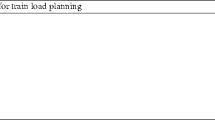Abstract
Subway last train timetabling focuses more on train coordination to make passengers transfer smoothly. Aiming to find an optimal balanced timetabling, a multi-objectives programming model is proposed with speed profile control for finding the optimal train velocity on sections and train dwell time at stations. Our work makes two contributions. First, this paper analyzes train movements in a line and provides an energy flow transferring method. Second, based on the analysis of train velocity and energy flow, an optimization model, in which passenger satisfaction, train trip time and network energy consumption are model objectives, is brought into the last train timetabling. Finally, to obtain an approximately optimal scheduling strategy, an artificial intelligence algorithm is proposed in particular to effectively solve the proposed model. The results of numerical experiments demonstrate the efficiency and effectiveness of the proposed method.
Access this chapter
Tax calculation will be finalised at checkout
Purchases are for personal use only
Similar content being viewed by others
References
Kang L, Zhu X (2017) Strategic timetable scheduling for last trains in urban railway transit networks. Appl Math Model 45:209–225
Kang L, Meng Q (2017) Two-phase decomposition method for the last train departure time choice in subway networks. Transportation Research Part B: Methodological 000:1–15
Liqiao N, Peng Z, Wen-kai X et al (2016) Timetable synchronization optimization for urban rail transit in the last trains’ hour. J Transp Syst Eng Inf Technol 16(6):108–114 (in Chinese)
Kang L, Wu J, Sun H et al (2015) A practical model for last train rescheduling with train delay in urban railway transit networks. Omega 50:29–42
Kang L, Wu J, Sun H et al (2015) A case study on the coordination of last trains for the Beijing subway network. Transp Res Part B Method 72:112–127
Feng Z, Jungang S, Hanchuan P (2013) Optimization method for last train coordination plan of urban rail transit based on network operation. Procedia Soc Behav Sci 96:2706–2712
Xu R, Li X (2012) Comprehensive optimization for connection scheme of last trains in urban mass transit network. J Tongji Uni (Nat Sci) 40(10):1510–1516 (in Chinese)
Xu R, Zhang M, Jiang Z et al (2008) Study on departure time domain of the first and last trains of urban mass transit network based on operation coordination. J China Railway Soc 30(2):7–11 (in Chinese)
Acknowledgements
The authors gratefully acknowledge the support from “Key Research Project of Safety Assurance Technology of Urban Rail System” under China National “13th Five-Year Plan” (Grant No. 2016YFB1200402-002).
Author information
Authors and Affiliations
Corresponding author
Editor information
Editors and Affiliations
Rights and permissions
Copyright information
© 2018 Springer Nature Singapore Pte Ltd.
About this paper
Cite this paper
Xiang, W., Wang, Y. (2018). A Multi-objective Programming Model for Subway Last Train Timetabling. In: Jia, L., Qin, Y., Suo, J., Feng, J., Diao, L., An, M. (eds) Proceedings of the 3rd International Conference on Electrical and Information Technologies for Rail Transportation (EITRT) 2017. EITRT 2017. Lecture Notes in Electrical Engineering, vol 483. Springer, Singapore. https://doi.org/10.1007/978-981-10-7989-4_80
Download citation
DOI: https://doi.org/10.1007/978-981-10-7989-4_80
Published:
Publisher Name: Springer, Singapore
Print ISBN: 978-981-10-7988-7
Online ISBN: 978-981-10-7989-4
eBook Packages: EnergyEnergy (R0)




